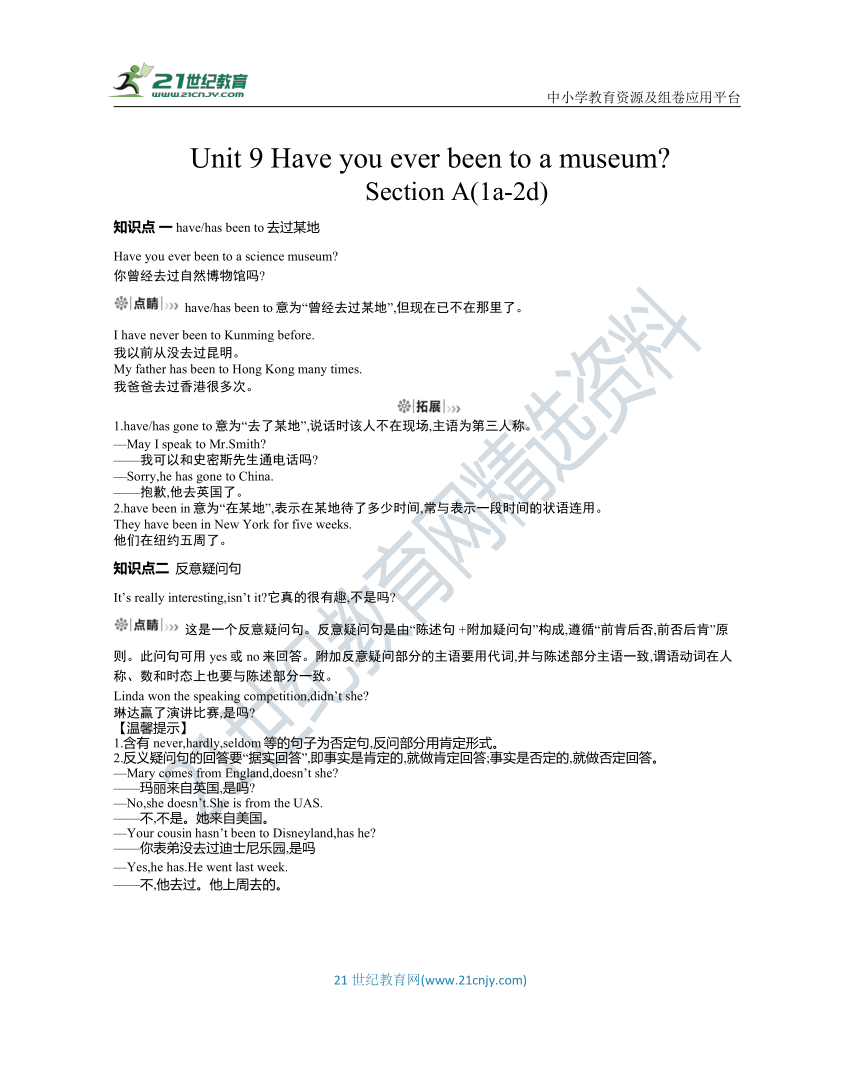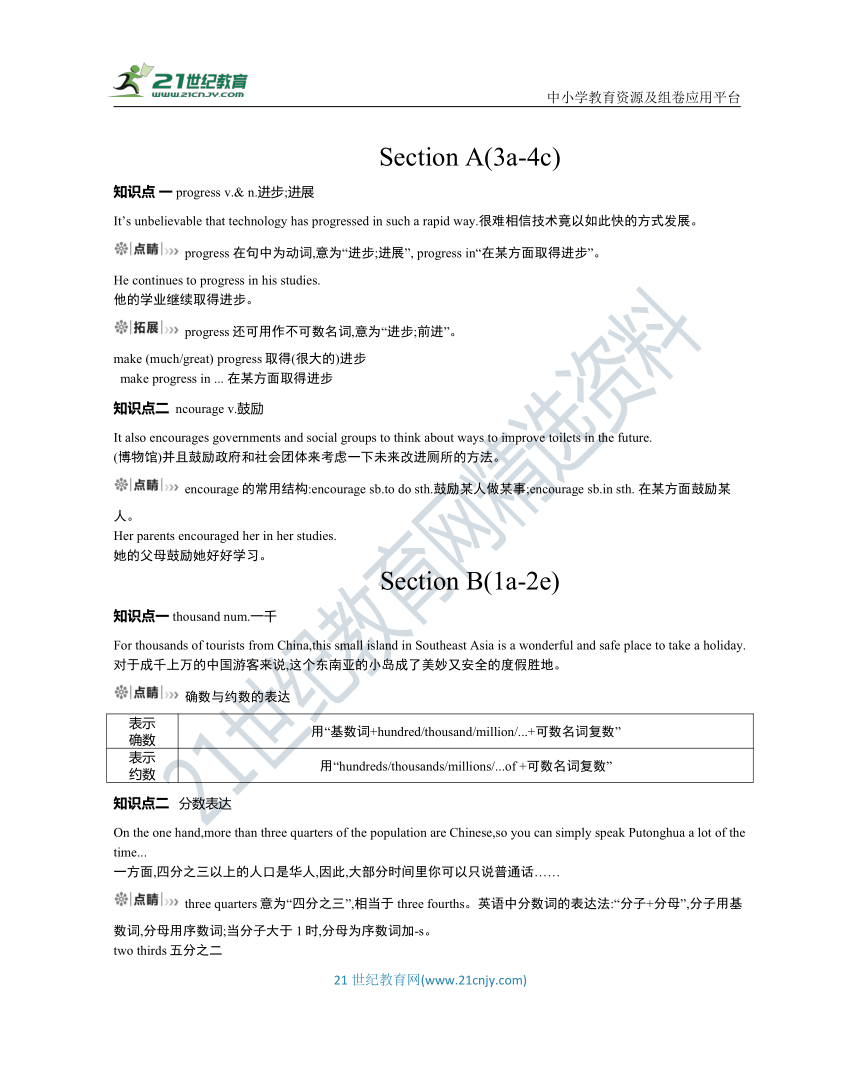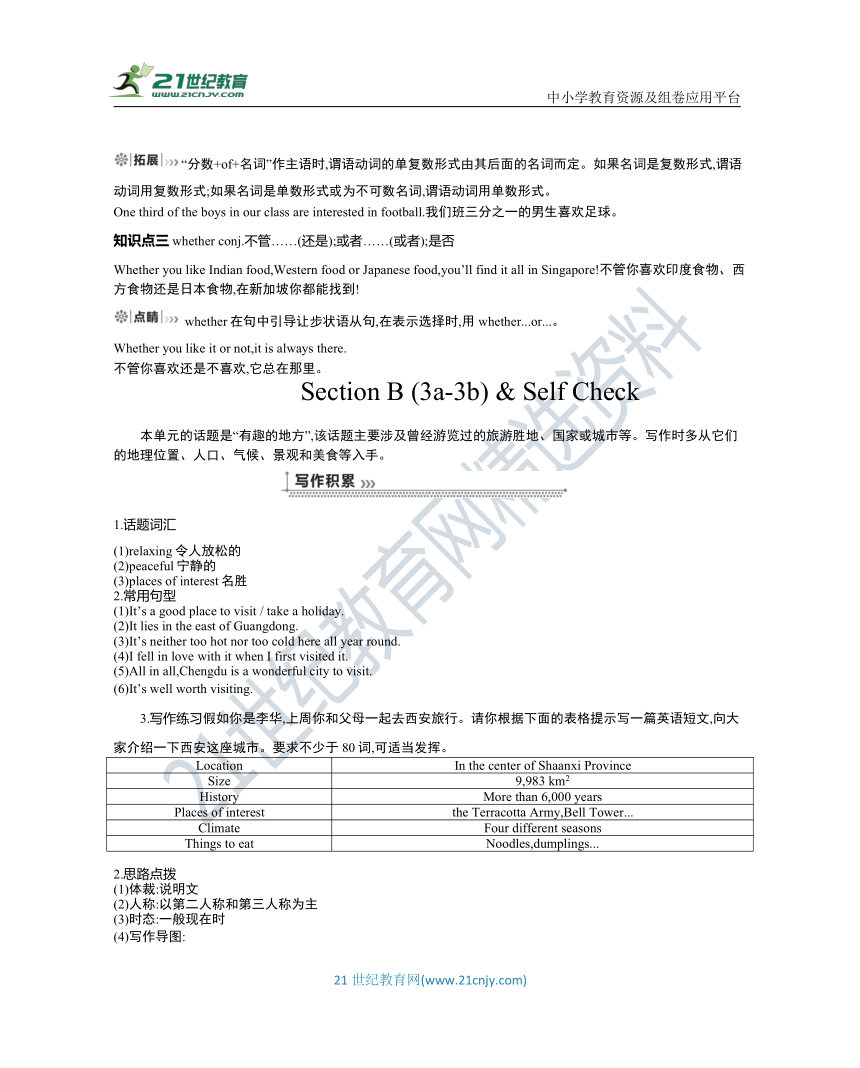Unit 10 I’ve had this bike for three years.要点讲解
文档属性
| 名称 | Unit 10 I’ve had this bike for three years.要点讲解 |  | |
| 格式 | zip | ||
| 文件大小 | 1.4MB | ||
| 资源类型 | 试卷 | ||
| 版本资源 | 人教新目标(Go for it)版 | ||
| 科目 | 英语 | ||
| 更新时间 | 2019-06-02 09:52:52 | ||
图片预览



文档简介
中小学教育资源及组卷应用平台
Unit 9 Have you ever been to a museum?
Section A(1a-2d)
知识点 一 have/has been to去过某地
Have you ever been to a science museum?
你曾经去过自然博物馆吗?
have/has been to意为“曾经去过某地”,但现在已不在那里了。
I have never been to Kunming before.
我以前从没去过昆明。
My father has been to Hong Kong many times.
我爸爸去过香港很多次。
1.have/has gone to意为“去了某地”,说话时该人不在现场,主语为第三人称。
—May I speak to Mr.Smith?
——我可以和史密斯先生通电话吗?
—Sorry,he has gone to China.
——抱歉,他去英国了。
2.have been in意为“在某地”,表示在某地待了多少时间,常与表示一段时间的状语连用。
They have been in New York for five weeks.
他们在纽约五周了。
知识点二 反意疑问句
It’s really interesting,isn’t it?它真的很有趣,不是吗?
这是一个反意疑问句。反意疑问句是由“陈述句 +附加疑问句”构成,遵循“前肯后否,前否后肯”原则。此问句可用yes或no来回答。附加反意疑问部分的主语要用代词,并与陈述部分主语一致,谓语动词在人称、数和时态上也要与陈述部分一致。
Linda won the speaking competition,didn’t she?
琳达赢了演讲比赛,是吗?
【温馨提示】
1.含有never,hardly,seldom等的句子为否定句,反问部分用肯定形式。
2.反义疑问句的回答要“据实回答”,即事实是肯定的,就做肯定回答;事实是否定的,就做否定回答。
—Mary comes from England,doesn’t she?
——玛丽来自英国,是吗?
—No,she doesn’t.She is from the UAS.
——不,不是。她来自美国。
—Your cousin hasn’t been to Disneyland,has he?
——你表弟没去过迪士尼乐园,是吗
—Yes,he has.He went last week.
——不,他去过。他上周去的。
Section A(3a-4c)
知识点 一progress v.& n.进步;进展
It’s unbelievable that technology has progressed in such a rapid way.很难相信技术竟以如此快的方式发展。
progress 在句中为动词,意为“进步;进展”, progress in“在某方面取得进步”。
He continues to progress in his studies.
他的学业继续取得进步。
progress还可用作不可数名词,意为“进步;前进”。
make (much/great) progress取得(很大的)进步
make progress in ... 在某方面取得进步
知识点二 ncourage v.鼓励
It also encourages governments and social groups to think about ways to improve toilets in the future.
(博物馆)并且鼓励政府和社会团体来考虑一下未来改进厕所的方法。
encourage的常用结构:encourage sb.to do sth.鼓励某人做某事;encourage sb.in sth. 在某方面鼓励某人。
Her parents encouraged her in her studies.
她的父母鼓励她好好学习。
Section B(1a-2e)
知识点一thousand num.一千
For thousands of tourists from China,this small island in Southeast Asia is a wonderful and safe place to take a holiday.对于成千上万的中国游客来说,这个东南亚的小岛成了美妙又安全的度假胜地。
确数与约数的表达
表示确数 用“基数词+hundred/thousand/million/...+可数名词复数”
表示约数 用“hundreds/thousands/millions/...of +可数名词复数”
知识点二 分数表达
On the one hand,more than three quarters of the population are Chinese,so you can simply speak Putonghua a lot of the time...
一方面,四分之三以上的人口是华人,因此,大部分时间里你可以只说普通话……
three quarters意为“四分之三”,相当于three fourths。英语中分数词的表达法:“分子+分母”,分子用基数词,分母用序数词;当分子大于1时,分母为序数词加-s。
two thirds五分之二
“分数+of+名词”作主语时,谓语动词的单复数形式由其后面的名词而定。如果名词是复数形式,谓语动词用复数形式;如果名词是单数形式或为不可数名词,谓语动词用单数形式。
One third of the boys in our class are interested in football.我们班三分之一的男生喜欢足球。
知识点三 whether conj.不管……(还是);或者……(或者);是否
Whether you like Indian food,Western food or Japanese food,you’ll find it all in Singapore!不管你喜欢印度食物、西方食物还是日本食物,在新加坡你都能找到!
whether在句中引导让步状语从句,在表示选择时,用whether...or...。
Whether you like it or not,it is always there.
不管你喜欢还是不喜欢,它总在那里。
Section B (3a-3b) & Self Check
本单元的话题是“有趣的地方”,该话题主要涉及曾经游览过的旅游胜地、国家或城市等。写作时多从它们的地理位置、人口、气候、景观和美食等入手。
1.话题词汇
(1)relaxing令人放松的
(2)peaceful宁静的
(3)places of interest名胜
2.常用句型
(1)It’s a good place to visit / take a holiday.
(2)It lies in the east of Guangdong.
(3)It’s neither too hot nor too cold here all year round.
(4)I fell in love with it when I first visited it.
(5)All in all,Chengdu is a wonderful city to visit.
(6)It’s well worth visiting.
3.写作练习假如你是李华,上周你和父母一起去西安旅行。请你根据下面的表格提示写一篇英语短文,向大家介绍一下西安这座城市。要求不少于80词,可适当发挥。
Location In the center of Shaanxi Province
Size 9,983 km2
History More than 6,000 years
Places of interest the Terracotta Army,Bell Tower...
Climate Four different seasons
Things to eat Noodles,dumplings...
2.思路点拨
(1)体裁:说明文
(2)人称:以第二人称和第三人称为主
(3)时态:一般现在时
(4)写作导图:
3.范文借鉴
Have you ever been to Xi’an? It’s a beautiful city.It lies in the center of Shaanxi Province and has an area of 9,983 square kilometers. With a history of more than 6,000 years,there are many places of interest in Xi’an,such as the famous Terracotta Army and the amazing Bell Tower. Xi’an has four different seasons. If you go to Xi’an,you will have a chance to try the delicious noodles,dumplings and many other traditional foods there. One great thing about Xi’an is that it has convenient transport. You can get there easily by train,plane or even bicycle!
I believe you’ll have a great time in Xi’an because it’s such a great place.
单元语法归纳与练习
现在完成时(二)
一、现在完成时表示在过去发生过一次或多次的动作,已成为某种经历,常和ever,never,before(从前),since,twice 等连用。
I have heard of him before.我以前听说过他。
二、have been to,have gone to 与have been in 的区别
【温馨提示】 have gone to 及have been to 后接地点副词(here,there等)时,需省略介词to。
Mr.Li has been to the place of interest.Let’s go and ask him if we can get there by bus.
李先生曾去过那个旅游胜地。让我们去问问他我们可否乘巴士去那里。
The teacher has gone to Xi’an.He will be back next Saturday.老师去西安了。他下周六回来。
Mike has been in Shanghai for three years.
迈克来上海三年了。
三、现在完成时与一般过去时的区别
区别 例句
一般过去时 强调动作发生在过去某个时间或状态存在于过去某个时间 Tom lived in Beijing two years ago.两年前汤姆住在北京。(不知道现在是否还住在北京)
现在完成时 强调过去的动作对现在的影响 Tom has lived in Beijing for two years.汤姆住在北京两年了。(现在汤姆还住在北京)
The old man has lived in the small wooden house since 2000.
那位老人从2000年起就住在那座小木屋里。(他现在还住在那里)
The old man lived in the small wooden house in 2000.那位老人2000年时住在那座小木屋里。(现在不知是否还住着)
I have seen the teacher.
我已经见过老师了。(强调见过老师)
I saw the teacher last year.
我去年看见老师了。(强调去年见过老师)
HYPERLINK "http://21世纪教育网(www.21cnjy.com)
" 21世纪教育网(www.21cnjy.com)
同课章节目录
- Unit 1 What's the matter?
- Section A
- Section B
- Unit 2 I'll help to clean up the city parks.
- Section A
- Section B
- Unit 3 Could you please clean your room?
- Section A
- Section B
- Unit 4 Why don't you talk to your parents?
- Section A
- Section B
- Unit 5 What were you doing when the rainstorm came
- Section A
- Section B
- Review of Units 1-5
- Unit 6 An old man tried to move the mountains.
- Section A
- Section B
- Unit 7 What's the highest mountain in the world?
- Section A
- Section B
- Unit 8 Have you read Treasure Island yet?
- Section A
- Section B
- Unit 9 Have you ever been to a museum?
- Section A
- Section B
- Unit 10 I've had this bike for three years.
- Section A
- Section B
